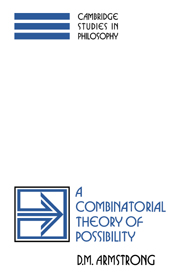1 - The causal argument
Published online by Cambridge University Press: 05 June 2012
Summary
THEORIES OF POSSIBILITY
Every systematic philosophy must give some account of the natureof possibility. The main constraint I wish to place on such anaccount is that it be compatible with Naturalism. The term ‘Naturalism’ is often used rather vaguely, but I shall understand by it thedoctrine that nothing at all exists except the single world of spaceand time. So my objective is to give an account of possibility whichis in no way other-worldly.
A non-Naturalist theory of possibility tries to account for thenotion by postulating entities additional to the world of space andtime, for instance, possible worlds or ‘abstract’ propositions. It willbe useful to begin by criticizing some non-Naturalist theories, concentratingespecially on the account given by David Lewis.
Among the non-Naturalist theories of possibility there is one,not Lewis's, which has a central place. This is because other theoriescan be seen as reactions to it. The theory is popularly attributedto Leibniz, although the textual warrant for this is dubious. But it isconvenient to call it the Leibnizian view.
According to this view, over and above the actual world thereare an indefinite multiplicity of merely possible worlds. They constituteall the ways that the world could have been. Included in theactual world are its past, its present and its future. The actual world contains minds, perhaps matter, perhaps God, perhaps still strangerthings. The actual world is a possible world. The other possibleworlds, the merely possible worlds, are ways that the actual worldmight have been.
- Type
- Chapter
- Information
- A Combinatorial Theory of Possibility , pp. 3 - 13Publisher: Cambridge University PressPrint publication year: 1989



